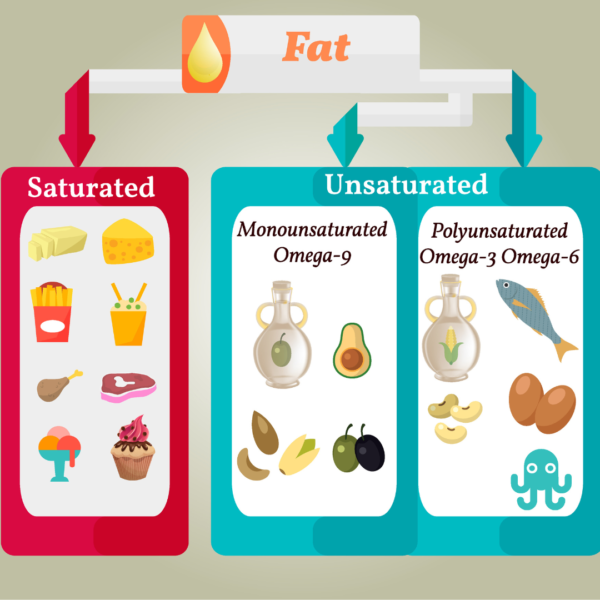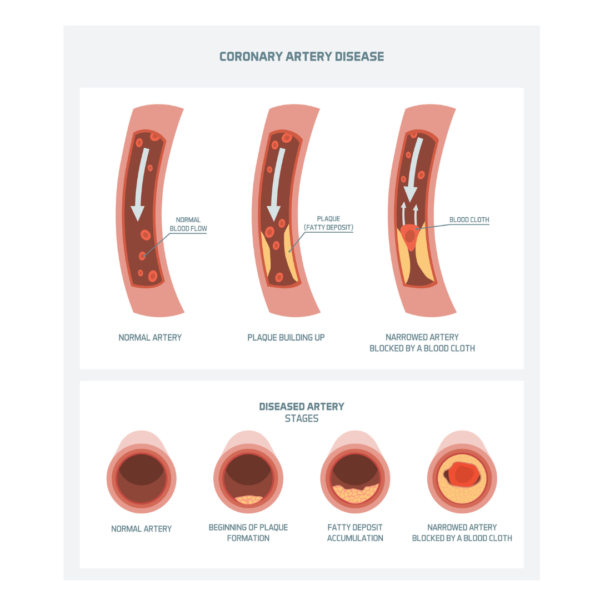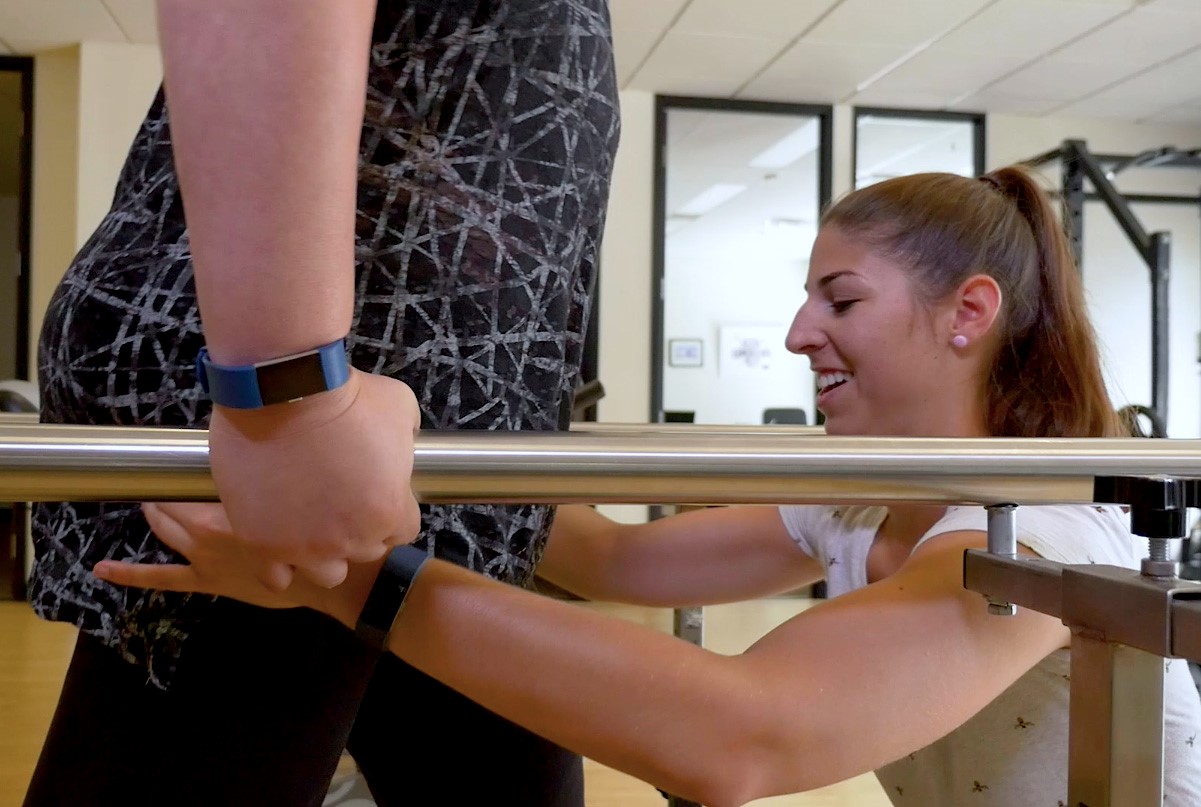Your heart is a muscle and its job is to pump oxygen-rich blood to the body and send oxygen-poor blood to the lungs. It is integral to all of our body’s systems and plays a vital role for muscular function. In addition, our circulatory system is highly dependent on our heart’s ability to create appropriate blood pressure.
Heart disease affects the structure and functions of the heart. It can diminish the heart’s ability to do this job. Several risk factors can determine whether you will develop heart disease. Some factors related to your risk of developing heart disease cannot be changed like your age, family history, and gender. Fortunately, most types heart disease are preventable and manageable by engaging in healthy lifestyle choices.
In this article, we will look at how to improve heart health using six strategies recommended by the Heart and Stroke Foundation of Canada, plus we will talk about how mindfulness training can help you stick to positive lifestyle changes like getting and staying active. We will also discuss cardiac rehabilitation and how our therapists can help you recover from a heart attack.
Table of Contents
- Six strategies to reduce heart disease risk
- Mindfulness training leads to positive lifestyle changes
- Heart attack recovery and cardiac rehabilitation
- Mindfulness meditation and heart function
- Conclusion
Six Strategies to Reduce Heart Disease Risk
With the heart being such an important organ, it is important that we keep it healthy and functioning optimally. Fortunately, there are things we can do to prevent heart problems. And, if we do have heart problems, there are things we can we do to make it better.
According to the Heart and Stroke Foundation of Canada, implementing these six strategies, you are giving your heart longevity in its role as a vital organ[i]:
1. Stay Active
There are numerous benefits of incorporating regular physical activity in your life. Activity can help lower your blood pressure and cholesterol, help to control blood sugars, improve cardiovascular health, and improve overall heart function.
Related story: Exercise Guidelines for Adults with Spinal Cord Injury
You should always consult a healthcare professional before starting any exercise program. A physiotherapist, exercise physiologist or kinesiologist can help create an exercise program that is right for you. They can help to assess your current exercise level, help to set achievable SMART goals and develop an exercise routine that works for you. In addition, we can analyze your form on exercises and ensure you are safe when performing them.
Safe activities to incorporate into your daily routine can include:
- Getting off the bus or subway a few stops early and walk
- Taking the stairs instead of the elevator
- Parking as far away from the building as possible, as long as it is safe
- Use the washroom on another floor
Related story: Benefits of Regular Exercise
2. Eat Healthy
A heart healthy diet includes eating lots of fruits and vegetables, whole grains, choosing healthy protein and limiting processed foods, sugars and salt. Canada’s Food Guide is a good resource for tips on how to make better food choices.
Although most of us know what we should be eating, it can be challenging to maintain good habits. Try some of these tips and try to make them part of your routine:
- Create a weekly meal plan
- Don’t grocery shop on an empty stomach
- Avoid the junk food aisle at the grocery store
- Keep fruit and healthy snacks at eye level and easily accessible
- Use smaller plates for meals
- Eat home-cooked meals instead of eating out
Related story: Top 5 Heart Healthy Foods
3. Reduce Stress
Stress can cause the heart to work harder, blood pressure to rise, and it increases the levels of sugars and fats in the bloodstream. This can then increase the risk of clots forming and cause a heart attack or stroke.[ii] We all know that stress is a part of life, but we can take steps to better manage stress.
At Propel Physiotherapy, we understand the mind-body connection. That’s why we take an integrated approach to healthcare, offering services like:
Mindfulness Training
Mindfulness can help in how we perceive and respond to stressful situations and events. The intention of mindfulness practice is to bring present awareness to whatever is arising (i.e. be in the moment). Specifically, mindfulness helps to activate the parasympathetic response in situations that may lead to unnecessary stress, thereby helping to calm the nervous system.
Unchecked stress can lead to chronic stress, which has been shown to elevate blood sugar, triglycerides, blood pressure and blood cholesterol. Research has found that with mindfulness practice, levels of stress hormones such as cortisol are reduced in meditators.
You may also enjoy reading: Reduce Stress & Chronic Pain with Mindfulness
We provide group mindfulness training, as well as one-on-one sessions to help clients foster mindfulness practice in their daily lives. Sessions help provide you with the tools to better manage life’s stressors.
Yoga Therapy
While the linking of the breath and movement will form the core of this practice, participants will draw upon a myriad of techniques – such as conscious breath regulation, meditative practices, and the use of sound – to improve health and well being and increase quality of life. Yoga has been shown to be effective in stress management.[iii]
Registered Massage Therapy
Massage therapy is used to improve circulation and range of motion, decrease tone and spasticity, improve soft tissue extensibility, stimulate lymphatic drainage and blood circulation, as well as decrease pain and ease stiffness. Massage can help to reduce stress and anxiety levels, especially for those who are consistently challenged in a high-paced work environment. Take some time to unwind and enjoy a massage therapy session.
Talk to us about making healthier lifestyle choices and how to reduce your risk of developing heart disease.
4. Minimize intake of trans-fats and saturated-fats
Minimizing the intake of trans-fats and saturated fats is crucial for improving heart health. Trans-fats, commonly found in processed and fried foods, have been strongly linked to an increased risk of heart disease. They do this by raising harmful LDL cholesterol levels while lowering beneficial HDL cholesterol levels.
Similarly, saturated fats, present in high amounts in fatty meats, full-fat dairy products, and tropical oils, can raise LDL cholesterol, leading to the development of atherosclerosis and cardiovascular problems.
By reducing the consumption of these unhealthy fats and opting for healthier alternatives such as unsaturated fats from sources like nuts, seeds, avocados, and olive oil, individuals can promote cardiovascular well-being, lower the risk of heart disease, and support overall health and longevity.
5. Minimize alcohol consumption
Alcohol can increase blood pressure, weaken the heart muscle, and raise the levels of triglycerides, a type of fat in the blood. These effects can contribute to the development of various heart conditions, including hypertension, arrhythmias, and cardiomyopathy.
Additionally, alcohol can interact negatively with medications used to treat heart conditions, further compromising cardiovascular health. It is important to consult with a healthcare professional for personalized advice regarding alcohol consumptions, particularly for individuals with pre-existing heart conditions or other health concerns.
By reducing alcohol intake or practicing abstinence, you can protect your heart, lower your risk of heart disease, and promote overall well-being.
6. Be smoke free
Smoking tobacco is a leading cause of heart disease, as it damages the blood vessels, reduces oxygen supply, and increases the risk of blood clots. The harmful chemicals in cigarettes, including nicotine and carbon monoxide, raise blood pressure and heart rate, strain the cardiovascular system, and contribute to the buildup of plaque in the arteries.
By quitting smoking, individuals can significantly reduce their risk of heart disease, heart attacks and stroke. Within a short time of quitting, the body begins to repair itself, and the risk of heart-related complications steadily decreases. Furthermore, quitting smoking improves lung function, increases energy levels, and enhances overall well-being.
Support from healthcare professionals, cessation programs and the encouragement of friends and family can greatly assist individuals in their journey to becoming smoke free and achieve a healthier heart and better quality of life.
These are six great ways to improve your heart health and reduce your chances of developing heart problems.
Mindfulness Training Leads to Positive Lifestyle Changes
Healthy behaviours such as exercise, healthy eating and smoking cessation can all improve heart health. Mindfulness has been linked to individuals beginning and maintaining these healthy lifestyle habits.
Through focused attention and decentering process (i.e. thinking of cravings as mental events) meditation training can lead to positive lifestyle changes.
The benefits of mindfulness in maintaining a healthy lifestyle and healthy heart are evident. Mindfulness has been shown to have numerous positive effects on the cardiovascular system.
At Propel Physiotherapy, our registered physiotherapist and mindfulness coach Kathy Mileski uses a mindfulness and movement-based therapeutic approach in providing client care. See how mindfulness training can help improve your health.
Related story: Meaningful Goals Fuel Motivation
Heart Attack Recovery & Cardiac Rehabilitation
If the coronary arteries that supply oxygen-rich blood to your heart are blocked, this is considered coronary heart disease. According to the World Health Organization (2014), coronary heart disease is the single most common cause of death, globally.[iv]
If the blood supply to the heart is interrupted enough, a person can suffer a myocardial infarction (also known as a heart attack). When a heart attack occurs, it means the blood supply to the heart itself has been compromised to the extent that portions of heart tissue die. The extent of damage to the heart itself is highly related to the amount of time left untreated. This can lead to mild to severe heart dysfunction.
With more individuals surviving heart attacks, it’s no surprise that physiotherapy and cardiac rehabilitation has helped to improve the lives of many survivors.
Cardiac rehabilitation consists of exercise-based interventions that target aerobic (oxygen-driven) movements. Typically, programs will consist of stationary cycling, walking on a treadmill, circuit training, full body stretching, and education.
As per the physiotherapist and physician’s assessment, exercise intensities can range from 50-85% maximum heart rate, 1-7X/week, 20-90 minutes (total session time), and last from 1-48 months. These intensities and duration are dependent on the severity and progress of a person’s heart attack.
Anderson et al., 2016 reviewed 63 Randomized Control Trials for cardiac rehabilitation and concluded that those who engaged in cardiac rehabilitation after having a heart attack significantly reduced their risk of mortality from another heart attack and improved their overall health-related quality of life.[v]
Mindfulness Meditation & Heart Function
When it comes to mindfulness, we most often hear how mindfulness can help with stress, anxiety, chronic pain and depression. What is sometimes overlooked is whether mindfulness can improve heart health.
In fact, mindfulness has physiological effects on the entire body. Numerous studies over the past decade have found that meditation can improve a variety of factors linked with heart disease, making it an important part of heart health.
Meditation practices can have a beneficial effect on many important physiological factors involved in heart function including heart rate, blood pressure, and heart rate variability.
Mindfulness techniques (including meditation) are being integrated more and more into cardiac rehab programs, while family physicians are increasingly prescribing mindfulness to their clients.
How to Improve Heart Health
In conclusion, by following these heart health strategies, you can significantly enhance the longevity of your heart as a vital organ. Adopting a healthy diet, engaging in regular physical activity, and managing stress can promote overall cardiovascular well-being.
Moreover, minimizing the intake of trans-fats and saturated fats, reducing alcohol consumption, and maintaining a smoke-free lifestyle are essential practices that directly contribute to a healthier heart.
By implementing these measures, you not only improve your heart health but also reduce the likelihood of developing heart problems. Taking proactive steps towards a heart-healthy lifestyle is a powerful investment in your long-term health and quality of life.
If you have questions about how to improve heart health contact us to book a complimentary consultation with one of our therapists.
References
[i] Azzolino D, Spolidoro GCI, Saporiti E, Luchetti C, Agostoni C and Cesari M (2021) Musculoskeletal Changes Across the Lifespan: Nutrition and the Life-Course Approach to Prevention. Front. Med. 8:697954. doi: 10.3389/fmed.2021.697954
[ii] What is Heart Disease, Heart and Stroke Canada
[iii] Chong, Cecilia S M, BS; Tsunaka, Megumi, BS; Tsang, Hector W H, PhD; Chan, Edward P, BA; Cheung, Wai Ming, PhD Effects of Yoga on Stress Management in Healthy Adults: A Systematic Review.Alternative Therapies in Health and Medicine; Aliso Viejo Vol. 17, Iss. 1, (Jan/Feb 2011): 32-8
[iv] World Health Organization
[v] Exercise-based cardiac rehabilitation for coronary heart disease. Anderson et al. Cochrane Heart Group. January 5, 2016.
Written by




















